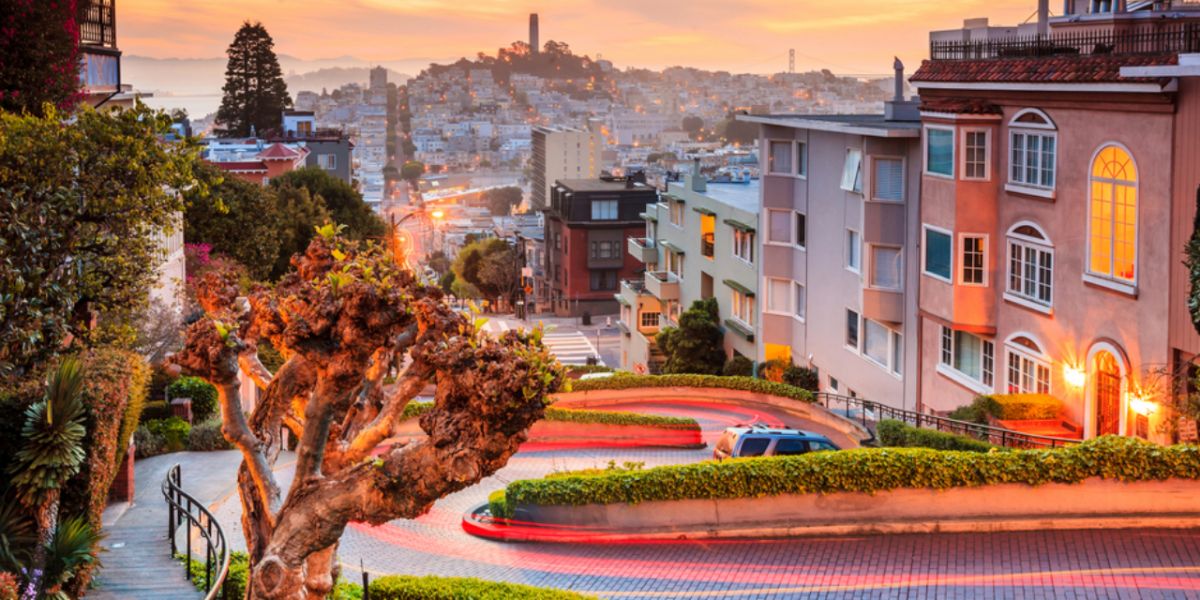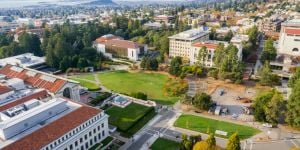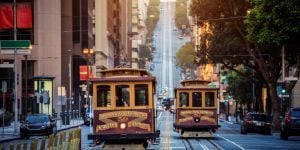
San Francisco is a great place to live if you're seeking a dynamic, culturally diverse urban lifestyle, access to major employers in tech and finance, and proximity to some of the most beautiful natural scenery in the United States. However, the extremely high cost of living in San Francisco and the competitive housing market can be challenging. While it's still possible to find a comfortable place in San Francisco, be aware that financial planning, flexibility and patience will be a big part of finding accommodation in this sought-after city.
Where to live in San Francisco
The first thing you should look into before starting your apartment hunt in San Francisco is the city's neighborhoods. The neighborhood you choose to live in can affect your lifestyle, your impression of the city, your quality of life—and, obviously, your rent. Although the city is small in size when compared with some other US cities, its cultural diversity makes each neighborhood distinct. When searching for the best place to settle in the city, consider a number of factors: Is it close to work? Are there good schools in the area? Does the area match your lifestyle? Will you have access to all the amenities you need?
SoMa (South of Market)
SoMa used to be a primarily industrial district that was then transformed into a tech hub during the dot-com boom. Today, it is one of the coolest neighborhoods in San Francisco, home to startups, art galleries, hip restaurants, dive bars, and lively nightspots. It is also a fun and affordable place to settle for young professionals. The average rent for a studio in this neighborhood is around $2,400, and for one-bedrooms, it is around $2,999.
Marina
Located at the waterfront, Marina is an upscale neighborhood with plenty of restaurants, boutiques, and modern homes and apartments. Here, you will also find popular tourist attractions like the Golden Gate Bridge, Crissy Field, and the Palace of Fine Arts. It's an affluent neighborhood, and the rent prices reflect this, with one-bedrooms setting you back around $3,250.
Pacific Heights
Offering stunning views of the coast and Golden Gate Bridge, Pacific Heights is also home to the most expensive and exclusive stretch of land in the city, known as the Gold Coast—one of the most expensive areas to live in in the US. Smaller units can be found for around $2,700 to $3,500 a month.
Noe Valley
Once a mainly working-class area, Noe is now an upscale yet family-friendly district favored by professionals. Cafes, nice parks and good public transport make it an appealing spot. Studios average $2,600, and one-bedrooms $3,300.
Sunset District
The Sunset District stretches toward the Pacific Ocean and offers a more residential, suburban feel compared to central neighborhoods. It's also among the more affordable areas, with studios averaging $2,200 and one-bedrooms around $2,750. Expect cooler weather and fog, especially from May to August.
Richmond District
A diverse, family-oriented neighborhood, Richmond combines proximity to Golden Gate Park and Ocean Beach with lower prices than the city center. It has strong Chinese, Russian, and Irish influences. Studios rent for about $2,250, and one-bedrooms around $2,800.
Other popular areas in San Francisco include the Mission District, Hayes Valley, and Dogpatch.
The cost of living in San Francisco
The average rent citywide is between $2,800 and $3,500 for a one-bedroom apartment, depending on location and amenities. While prices have eased slightly, San Francisco remains one of the most expensive rental markets in the United States.
Overall living costs, including groceries, healthcare, transportation, and dining, are about 80–90% higher than the US national average. For expats or newcomers, budgeting for housing and deposit requirements is essential, and most tenants will spend a large share of their income on rent.
The average rent for an apartment in San Francisco is $3,336. The cost of rent in San Francisco varies depending on several factors, including location, size, and quality. Therefore, the cost of living in San Francisco can be relatively high for expats.
Types of accommodation and rent prices in San Francisco
Apartments dominate the city's housing stock. Detached houses are scarce and often reserved for the luxury market. Don't expect to move into a townhouse or the famous Queen Anne homes the city is known for.
Expats and newcomers typically choose from:
- Apartments in multi-unit buildings (most common).
- Shared houses or co-living spaces for affordability.
- Accessory dwelling units (granny flats) in residential neighborhoods.
Room or flat-sharing remains one of the most practical ways to live within your budget. Many listings can be found on Craigslist, Zillow, Apartments.com, and local Facebook groups.
When comparing accommodation, consider access to BART and Muni public transit lines, especially if you work outside your neighborhood.
Leasing conditions in San Francisco
Lease agreements in San Francisco are typically for 12 months, though shorter options do exist. A lease will typically lay out the rent amount, duration, and maintenance responsibilities. Most apartments require a security deposit equal to one or two months' rent.
Before signing, tenants should always:
- Inspect the property in person or via live video tour.
- Review guest policies and roommate clauses carefully.
- Ensure the lease includes all property rules and conditions in writing.
- Check whether the unit is covered by San Francisco's rent control laws (which limit annual rent increases and protect tenants from unjust eviction).
Eviction protections remain strong today, with most tenants covered by “just cause” eviction laws that restrict termination except for non-payment, nuisance, or owner move-in.
Buying property in San Francisco
As you have probably figured out by now, buying a house in San Francisco is incredibly expensive. In 2025, the median home sold price was $1.15M. Obviously, this price varies drastically between and even within neighborhoods, depending on the type of home you are buying, but there's no denying it's a huge financial investment and out of reach for many, which has contributed to the current housing crisis in the city.
Aside from the expense, buying property in San Francisco can also be a complex process, especially for expats who may not be familiar with the local real estate market and regulations. There may be regulations or hidden fees you are not aware of. Here are some key things expats should know when considering buying property in SF.
Local real estate agents
Working with a licensed real estate agent familiar with San Francisco's complex market is essential. They can assist with negotiations, inspections, and bidding in a highly competitive environment.
Financing
Expats and foreign buyers can face extra challenges when it comes to financing a property purchase. Mortgage lenders typically require a US bank account and proof of income. International buyers may need to work with specialized financing institutions or provide larger down payments.
Legal and tax considerations
Seek legal advice from an attorney who specializes in real estate transactions to ensure that you understand the legal aspects of property acquisition in the United States. Additionally, expats should be aware of the tax implications of owning property in the US, including property taxes and potential capital gains taxes.
Homeowners' Association (HOA) fees
If you are purchasing a condominium or property in a planned community, there may be HOA fees. These fees cover maintenance and services in the community and can vary widely, from $400 to over $1000 a month. Make sure to understand these costs and what they include.
Closing costs
Budget 2-5% of the purchase price for closing costs. These can include real estate agent commissions, title insurance, and escrow fees.
Useful links:
We do our best to provide accurate and up to date information. However, if you have noticed any inaccuracies in this article, please let us know in the comments section below.








